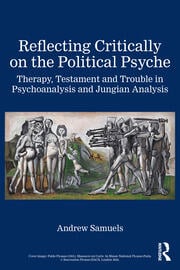Psychology as Ethics: Reading Jung with Kant, Nietzsche and Aristotle
Part of Philosophy and Psychoanalysis series - more in this series

Book Details
- Publisher : Routledge
- Published : October 2020
- Cover : Paperback
- Pages : 154
- Category :
Psychoanalysis - Category 2 :
Jung and Analytical Psychology - Catalogue No : 95286
- ISBN 13 : 9780367529239
- ISBN 10 : 9780367529
There are currently no reviews
Be the first to review
Through his clinical work and extensive engagement with major figures of the philosophical tradition, Jung developed an original and pluralistic psycho-ethical model based on the cooperation of consciousness with the unconscious mind.
By drawing on direct quotations from Jung's collected works, The Red Book, and his interviews and seminars - as well as from seminal texts by Kant, Nietzsche, Aristotle and Augustine - Giovanni Colacicchi provides a philosophically grounded analysis of the ethical relevance of Jung's analytical psychology and of the concept of individuation which is at its core. The author argues that Jung transforms Kant's consciousness of duty into the duty to be conscious while also endorsing Nietzsche's project of an individual ethics beyond collective morality. Colacicchi shows that Jung is concerned, like Aristotle, with the human need to acquire a balance between reason and emotions; and that Jung puts forward, with his understanding of the shadow, a moral psychology of the Christian notion of evil. Jung's psycho-ethical paradigm is thus capable of integrating ethical theories which are often read as mutually exclusive.
Psychology as Ethics will be of interest to researchers in the history of ideas and the philosophy of the unconscious, as well as to therapists and counsellors who wish to place their psychodynamic work in its philosophical context. It will also be a key reference for undergraduate and postgraduate courses and seminars in Jungian and Post-Jungian studies, philosophy, psychoanalytic studies, psychology, religious studies and the social sciences.
Reviews and Endorsements
'This is an immensely important book for understanding Jung's thought and its connections to broader culture. Colacicchi argues compellingly that psychotherapy was for Jung inherently ethical, concerned with how we should live. He then clarifies in unprecedented detail the complex nature of that ethical thought, with its multiple and seemingly contradictory sources in Kant, Nietzsche, Aristotle, and Christianity. Lucid and perceptive, the book will facilitate philosophical engagement with Jung's thought as well as provide a fertile ground for studying analytical psychology comparatively with other traditions of psychotherapy.' - Roderick Main, Professor, Department of Psychosocial and Psychoanalytic Studies, University of Essex.
'...Colacicchi's volume will be the definitive discussion of Jung's moral theory for some time to come. Deeply knowledgeable about both Jung and moral philosophy, it is a rich and ambitious synthesis that illuminates timeless questions concerning the place of morality in our lives and Jung's unique understanding of them.' - Michael Lacewing, University College London, Co-editor of The Oxford Handbook of Philosophy and Psychoanalysis.
' In 1926 Nicolai Hartmann argued that the task of ethics is to achieve a synthesis of Nietzsche and Kant, while in 1943 Jung admitted that psychotherapists should really be philosophers - or are, in fact, already so. But what would this mean in practice? Giovanni Colacicchi offers a fresh and in-depth analysis that shows how Jung reshapes Kantian and Nietzschean themes, recasting them in the language of analytical psychology... essential reading for academic critics and clinical practitioners alike.' - Paul Bishop, William Jacks Chair of Modern Languages, University of Glasgow.
'This book is a welcome addition to the literature which sets out from the assumption that psychoanalytic writing - in this case, Jung's - and the Western canon in moral philosophy, which includes Aristotle, Kant and Nietzsche, are all part of the same conversation. In so doing, it helps to make the assumption compelling.' - Edward Harcourt, Faculty of Philosophy, University of Oxford and Keble College, Oxford.
About the Author(s)
Giovanni Colacicchi, PhD, is an Anglo-Italian philosopher, independent scholar and teacher in the humanities. He lives and works in Ferrara, Italy.
Customer Reviews
Our customers have not yet reviewed this title. Be the first add your own review for this title.
You may also like
Reflecting Critically on the Political Psyche: Therapy, Testament and Trouble...
Andrew Samuels
Price £34.99
The Mutation of European Consciousness and Spirituality: From the Mythical to...
Willy Obrist
Price £19.99
Fathers and Mothers: Five Papers on the Archetypal Background of Family...
James Hillman
Price £16.00







